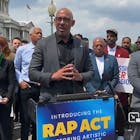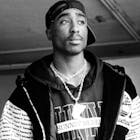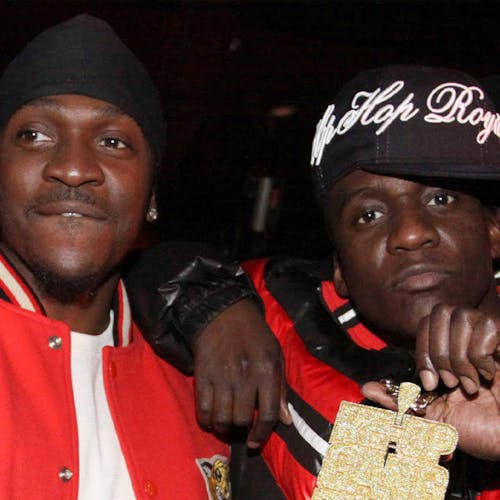
Drill Rap: The Symptom, Not the Disease – DayOneNotDayTwo Dives Deep to Address the Real Issues
Drill Rap: The Symptom, Not the Disease – DayOneNotDayTwo Dives Deep to Address the Real Issues
Published Thu, September 21, 2023 at 6:00 PM EDT
Andre "DayOneNotDayTwo" Simms is at the forefront of what he hopes will be a cultural shift.
Through his Philadelphia-based organization, DayOneNotDayTwo, created about two years ago, the poet/rapper/activist is driving change and inspiring young Black artists to enrich their work with affirmation and intention. DayOneNot DayTwo's innovative programming includes courses on emotional intelligence as well as the Ascension program, an 8-12 week music workshop that focuses on culturally conscious songwriting. The organization speaks to young Black people directly, encouraging them to use their creativity in ways that push them to think outside of the box, and reject the ideologies placed on them by intrinsically biased traditional education models.
"I always wondered what if all of the big artists who came from neighborhoods like mine used their influence to build up the communities they came from," Simms says. "I always felt like artists and entertainers have a responsibility to the communities that made them and so I wanted to model that and be an example of what it could look like if Hip-Hop and rap were used to heal. I understood how impactful creativity was in my journey to transformation and so that’s where the idea of healing through creative expression and building power through narrative came from."
By now we've all seen the statistics, with gun violence on the rise not only in Philly but in cities like Atlanta and Chicago. The violence is the result of a culmination of ongoing issues — from low wages and institutional disenfranchisement to a criminal justice system that's inherently biased, flawed, and targets Black communities. More and more, attention has turned to drill — a controversial sub-genre that originated in the South Side of Chicago in the early 2010s, and is marked by its dark, grim, and violent lyrics.
In 2022, New York Mayor Eric Adams called drill rap "alarming" and suggested it be removed from platforms, earning co-signs from some Hip-Hop artists including legendary producer Pete Rock. Naturally, there was pushback, especially considering the ongoing debate about rap lyrics being used in court—and whether or not the practice should be legal. (It's no longer allowed in California).
But what role does drill play in the violence, and how should it be addressed without ringing censorship alarms? While those questions still linger, Simms is intent on focusing on the positive and giving the young people involved in his organization the tools and motivation they need to create art that resonates.

Drill rap is just the consequence of hundreds of years of systemic oppression and generational trauma.
"My personal motivation is knowing the power of perspective," he says. "I see how our art is weaponized and used against us. I understand how important it is for us to shift the narrative. We are working to transform perspectives and shift the power structure within the music industry. We not only want artists to be more intentional about what they create and how it impacts those around them but we also want artists to be more intentional about ownership. The people who make the most from rap don’t look like the rappers or even the people listening to the music. That’s a big part of the problem."
To that end, Simms' days are packed with leading community initiatives. He co-teaches a solutions journalism class alongside Andre Wenzel at Temple University, works with Zealous to use art to help train public defenders on how to be better advocates for the community, leads the Ascension Coalition Broadcast, a show which "highlights transformative conversations, challenges conventional perspectives" and showcases artists doing great community work, and also runs a participatory defense hub for young people, offering support to individuals who are facing charges to get them the best possible outcome. He's also an artist, and often spends weekends performing. He says he specifically realized how powerful creativity as a tool was while he was serving an eight-year prison sentence as a teen. Creating music and poetry helped him focus and also challenged him to think differently.
Rock The Bells caught up with the community activist, rapper, and poet to get his take on drill, why Hip-Hop is such a powerful tool, and his continued work with his organization, DayOneNotDayTwo.


DROP YOUR EMAIL
TO STAY IN THE KNOW
What sparked your realization about the power of creativity in tackling issues like poverty and gun violence?
I realized how powerful creativity is in tackling issues like poverty and gun violence during an eight year prison sentence that I served when I was 17. Throughout that experience creating music and poetry helped me express and understand myself more. Through songwriting I was able to explore concepts that not only challenged my creativity but also challenged my cause and beliefs. It helped me develop my voice as an artist which eventually helped me develop my voice as a community organizer."
How are you reshaping the stories communities tell, especially with the influence of genres like drill rap hanging around?
We are challenging artists to be more intentional about their lyrics. A lot of younger artists haven’t really been taught about the power of affirmation, the power of vibration or the laws of attraction. What we speak into the universe we are creating in our own worlds. And when you pair affirmations with rhythm you are ultimately creating a ritual. So we are teaching young people how to reclaim their power and how to use that power intentionally. We’re not excluding anyone from the conversation though. We are reclaiming our narratives and transforming the way we talk about our communities.Some times that means taking drill beats and pairing them with high vibrational lyrics that challenge conventional paradigms. Also we are paying young people to create more intentional music so now the upcoming artist who is still developing creatively has an incentive to make music that speaks truth to power and has a meaningful impact on the community. The average young person might want to be like the rappers who they see on tv or hear on the radio but the reality is being an artist is expensive. Bills don’t stop just because we want to be creative and so if they have an opportunity to make money from music early on they are going to take advantage of it. And if you are confident in your craft you can make a hit song about anything. It ultimately challenges younger artists to be more creative because now in our program you can’t just say what everyone else is saying. It’s driving growth artistically as well as interpersonally.
Talk about drill rap and how specifically you feel it's affected young Black people. How should it be addressed or countered?
Drill rap is just the consequence of hundreds of years of systemic oppression and generational trauma. It’s Black America’s plight personified and the soundtrack of capitalism’s impact on communities of color. People hear drill music and they are offended by how violent and disrespectful it sounds but why aren’t equally as offended by how violent and disrespectful the conditions of black and brown communities are? How should drill music be addressed? We should address the underlying factors that lead to the conditions that support its existence. Let’s address our public education system. Let’s address poverty and housing insecurity. Let’s finally address ancestral trauma. Let’s provide reparations for black folks before we condemn young artists for creating art that reflects the reality of their environments. If we want to address drill music and it’s harmful consequences on the community we need to address capitalism and the label executives who aren’t from our communities but are profiting from promoting genocide.
The answer isn’t vilifying more Black people but we CAN counteract the effects of drill music on the culture by investing just as much into artist and programs that promote high vibrational content. As individuals we shouldn’t listen to music that glorifies activities that we wouldn’t be comfortable participating in. That means if you wouldn’t do a drill you shouldn’t be listening to it. If we are charging artists for what they talk about in their music then shouldn’t those who support it be accessories? Mainstream America loves to entertain theirselves with the struggles of Black people because it reinforces the narratives that they created. If we want to address drill, we have to first address the way America treats Black people.

"If we are charging artists for what they talk about in their music then shouldn’t those who support it be accessories? Mainstream America loves to entertain theirselves with the struggles of Black people."
When it comes to pushing positive Hip-Hop, what's been the biggest win or challenge for your organization? Why is it so important?
Our biggest challenge is funding. We are up against labels who spend millions and millions to feed harmful narratives to our communities. In order to counteract this we need that same level of investment to be able to compete and show kids that they don’t have to make music about killing, disrespecting women and selling drugs to be successful. If funders/investors knew how influential entertainers are in black communities we’d be able to mobilize our people through movement music.
What role do you see for Hip-Hop, and music in general, in both reflecting the realities of a community and shaping its future?
Music naturally reflects reality and shapes our futures. As artists we have a responsibility to the communities we come from to ensure that we are intentional about how our messages are impacting others. As an artist I use my platform to inspire and empower my listeners. I use my music as a tool to combat harmful propaganda and to expose the reality of this industry.

We are up against labels who spend millions and millions to feed harmful narratives to our communities. In order to counteract this we need that same level of investment to be able to compete and show kids that they don’t have to make music about killing, disrespecting women and selling drugs to be successful.
I'd love to hear more about the whole "liberation through education" idea. How's that playing out in real life?
Liberation through education is a motto that I’ve inherited from a loved mentor of mine Paul Perry. He is serving a life sentence for something that happened when he was in his early twenties. Now he’s in his 70s and even though he’s been ostracized by society and condemned to death, he’s been using his time to give back to his community in spite of being incarcerated. He’s helped to start the Inside/Out program which is now in multiple states and countries and brings college students inside of prison settings to learn alongside incarcerated individuals. He’s founded the public safety initiative which is a prisoner lead movement aimed at transforming the culture of street crime. He’s earned multiple degrees and taught college classes from behind bars. Something I learned from him was that freedom is a mindset. We have to decolonize our minds before we can truly be liberated. This model has proven true time and time again not only in my life but the lives of countless leaders in this field which is why we will always stand on that. When I came home two years ago I had nothing. I was homeless, staying in a halfway house with maybe a hundred dollars to my name and a feint record. In the midst of all that adversity and what some would call extreme poverty I made sure to cultivate a rich mindset. I refused to focus on what I didn’t have or didn’t want and instead directed my energy towards what I was here to manifest. Now two years later I’m in the position to be able to only support my music career but also the careers of other young artists. We are now providing direct services for individuals who are in the same situation I found myself in just two years ago. I’d say it’s playing out abundantly.
What's up next for you?
Right now we are looking to raise money to support the ascension music program so we can grow our impact and combat the culture of crime and violence. Anyone who’d like to support can donate directly on our website https://www.dayonenotdaytwo.com.
I’ll also be performing at Heaven Can Wait in New York City on September 30th to promote a new music video from a single titled “Fly Me To Mars” ft Omari Vel and Bymaddz. You can currently stream that song on all platforms and purchase tickets for the show here.





